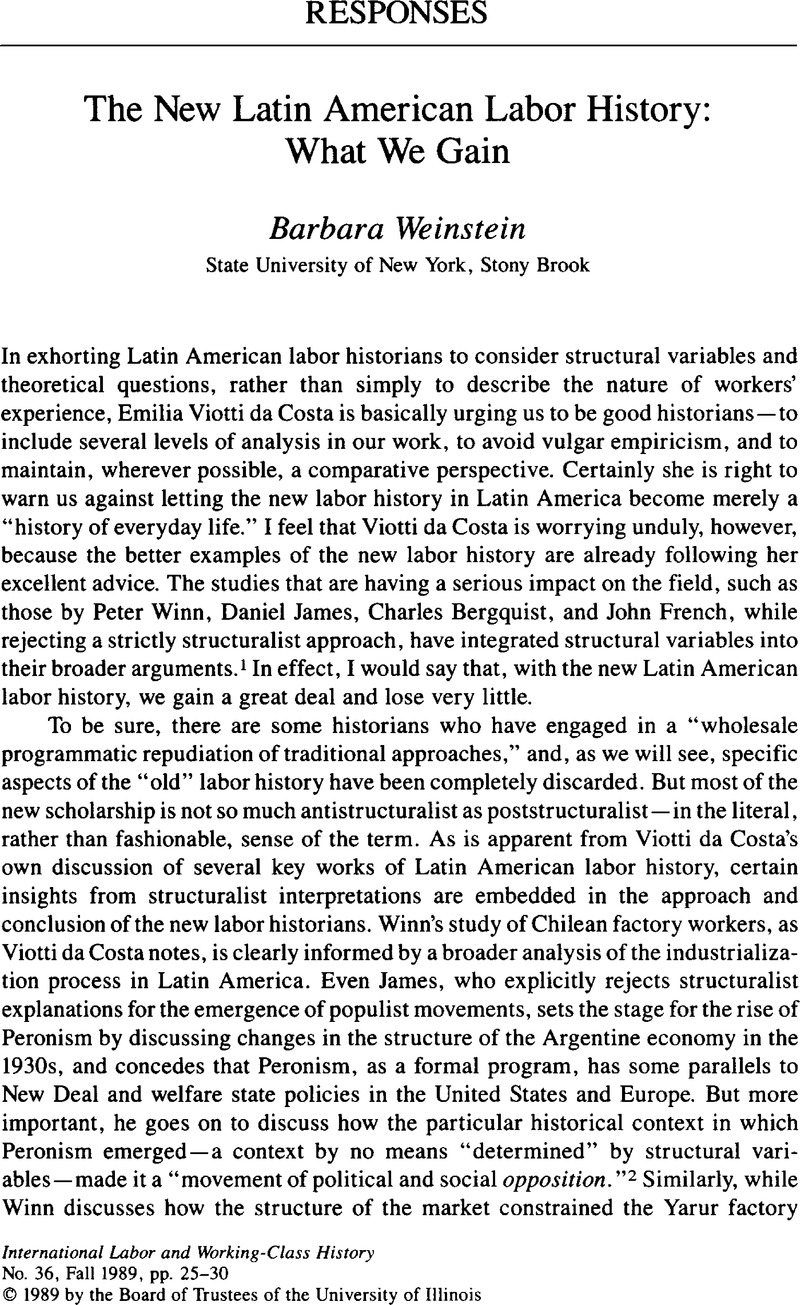Published online by Cambridge University Press: 16 December 2008

1. Charles Bergquist, in particular, is still very much influenced by structuralist approaches; while he generally avoids a deterministic approach to labor history, his primary emphasis on the structure of the export economy often undercuts his insistence on human agency. Bergquist, , Labor in Latin America: Comparative Essays on Chile, Argentina, Venezuela, and Colombia (Palo Alto, 1986).Google Scholar
2. James, Daniel, Resistance and Integration: Peronism and the Argentina Working Class, 1946–1976 (Cambridge, 1988), 39Google Scholar (emphasis in original). Even more explicitly, James discusses the intensification of working-class protest in Argentina from 1969 on as “related to longer-term structural factors which had been … facilitating the emergence of new opposition forces …” (223).
3. The “difficulties” were two-fold. First, there is the generally poorer preservation of documentation related to labor history in Latin America. Second, the repressive political climate in much of Latin America during this period created problems for those interested in doing oral history, and sometimes made it hazardous simply to be studying working-class politics.
4. Shazo, Peter de, Urban Workers and Labor Unions in Chile, 1902–1927 (Madison, 1983)Google Scholar; and French, John, “Workers and the Rise of Adhemarista Populism in Sao Paulo, Brazil, 1945–1947,” Hispanic American Historical Review 68 (02 1988): 1–43.CrossRefGoogle Scholar
5. Such preoccupations were not unique to students of labor movements. The political scientist, Philippe Schmitter, in discussing the persistence of authoritarianism in Latin America, asked “why had the industrial proletariat, instead of providing the vanguard of revolutionary initiative, fallen victim to ‘false consciousness’ so easily and been coopted?” Schmitter, , “Paths to Political Development in Latin America,” in Changing Latin America: New Interpretations of its Politics and Society, ed. Chalmers, Douglas A. (New York, 1972), 95.Google Scholar I am grateful to John French for this citation.
6. A particularly clear statement of the importance of conjunctural factors can be found in French, John, “Industrial Workers and the Birth of the Populist Republic in Brazil, 1945–1946” (Paper presented at the Latin American Studies Association Meetings, Boston, 23–2510, 1986).Google Scholar
7. Viotti da Costa is absolutely correct in arguing that the Yarur workers' actions can be understood only in the context of national political trends. But even in this case, the specific experience of the workers vis-à-vis national politics–for example, Salvador Allende's campaign speech in the factory–needs to be considered. Winn, Peter, Weavers of Revolution: The Yarur Workers and Chile's Road to Socialism (New York, 1986), 98–99.Google Scholar
8. An excellent local study of Brazilian labor shows both how important Communist party activists were for the mine workers' mobilization, and how much the mine workers influenced the party militants to modify their strategy and tactics. Grossi, Yonne de Souza, Mina de Morro Velho: A Extraçāo do Homem: Uma História de Experiência Operária (Rio, 1981).Google Scholar Unfortunately, this study is not available in English, but there is a detailed review by French, John in International Labor and Working-Class History 23 (Spring 1983): 116–20.CrossRefGoogle Scholar
9. The appeal of this belief in the workers' historical mission for those who study, and sympathize with, the struggles of Latin American workers in obvious. It should also be obvious that one can reject the essentialist or teleological view of the working class without rejecting the possibility or desirability of a socialist transformation led by the working class.
10. Munck, Ronaldo, “The Labour Movement in Argentina and Brazil: A Comparative Perspective,” in International Labour and the Third World, ed. Boyd, R. E., Cohen, R., and Gutking, P. C. W. (Hants, Eng., 1987).Google Scholar
11. Scott, Joan W., “On Language, Gender, and Working-Class History,” International Labor and Working-Class History 31 (Spring 1987): 1–13CrossRefGoogle Scholar, and especially the response by Christine Stansell, ibid., 24–29.